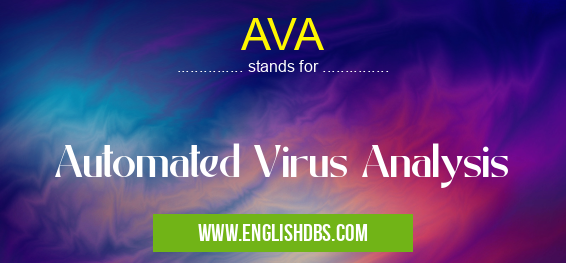What does AVA mean in CYBER & SECURITY
AVA, short for Automated Virus Analysis, is a method of analyzing malicious software with the help of automated tools. The purpose of AVA is to quickly identify and describe malware characteristics in order to enable protection against potential threats. The AVA process takes place in a secure environment where the suspect file is scanned and monitored for any suspicious behavior. By using automated techniques, security analysts can get a comprehensive understanding of an infected file and take appropriate action in order to protect systems from infections.

AVA meaning in Cyber & Security in Computing
AVA mostly used in an acronym Cyber & Security in Category Computing that means Automated Virus Analysis
Shorthand: AVA,
Full Form: Automated Virus Analysis
For more information of "Automated Virus Analysis", see the section below.
What Is AVA?
Automated Virus Analysis (AVA) is a method that uses automated tools to scan and monitor suspect files for any malicious activity. This type of analysis helps security analysts understand the nature of an infection more quickly than manual methods. It also makes it easier to detect any potential threats before they become damaging and cause serious damage to network systems or confidential data. With AVA, a number of different parameters such as memory footprint, program code usage, system interaction logs, etc., are analyzed in order to create an accurate picture of the malware’s characteristics.
Advantages Of Using AVA
Using Automated Virus Analysis has many advantages compared to manual methods when it comes to detecting malicious files. One major benefit is that it provides faster insights into the malware characteristics which helps organizations respond quicker and more effectively against attacks. Additionally, since no human involvement is required during the process, mistakes due to human error are minimized significantly which improves accuracy when analyzing a file's behavior. Moreover, using AVA eliminates tedious manual processes that can be time consuming or too expensive for some organizations.
Essential Questions and Answers on Automated Virus Analysis in "COMPUTING»SECURITY"
What is automated virus analysis?
Automated virus analysis (AVA) is a type of computer security system that uses software and hardware to monitor, detect, and analyze malicious activity in computer networks. It is typically used to help protect against viruses, worms, Trojans, rootkits, and other kinds of malware. AVA systems are designed to provide a high level of accuracy and reliability by employing technologies such as machine learning algorithms, artificial intelligence, and pattern recognition techniques to identify suspicious activity.
How do automated virus analysis systems work?
Automated virus analysis systems use software programs that simulate virtual environments on the network so they can monitor communication between computers on the same network. This enables AVA systems to detect malicious activities like port scanning as well as access attempts from outside the network. The program also looks for certain types of malicious code or other malicious behavior patterns within files or other requests sent over the network. If any suspicious activity is detected, the AVA system will issue an alert or take action to prevent further damage from occurring.
What types of malware does automated virus analysis help detect?
Automated virus analysis can be used to detect a wide range of malware including viruses, worms, rootkits, Trojans, mobile malware, ransomware and spyware. It can also detect previously unknown threats by using anomaly detection techniques which look for changes in normal patterns of usage or activity within the network.
Is automated virus analysis effective?
Yes. Automated virus analyzers are highly effective in detecting malicious code by using multiple layers of advanced technologies such as machine learning algorithms and artificial intelligence to analyze traffic across a network for suspicious behavior or activities related to different types of threats. They are also capable of identifying previously unknown threats by analyzing anomalies in normal usage patterns.
What are some benefits offered by automated virus analysis?
Automated Virus Analysis offers many benefits including increased security through early detection of threats; improved productivity through automation; decreased downtime due to fewer false positives; flexibility in response strategies; and greater accuracy in threat identification due to advanced technologies such as AI-based algorithms being used for analyses.
How reliable is automated virus analysis?
Automated Virus Analysis systems are highly reliable because they employ advanced technologies such as AI-based algorithms that enable more accurate detection rates when compared with traditional anti-virus solutions. Additionally, these systems can identify previously unknown threats by using anomaly detection techniques which look for changes in normal patterns of usage or activities within the network making them even more reliable against potential attacks.
Is automated virus analysis expensive?
The cost depends on factors such as number of users/workstations/servers protected; complexity level required; vendor selected; support services needed etc., however it typically offers good value for money compared with traditional anti-virus solutions due to its advanced features and capabilities.
Final Words:
In conclusion, Automated Virus Analysis (AVA) provides organizations with a powerful tool for quickly detecting and responding to malicious programs before they cause harm or disrupt systems operations. Its main advantages include speed improvements compared with manual methods, greater accuracy due to less human-error related mistakes being made during the process, as well as cost-efficiency benefits since there is no need for intense labor resources or additional manpower allocation when utilizing this technique.
AVA also stands for: |
|
| All stands for AVA |
